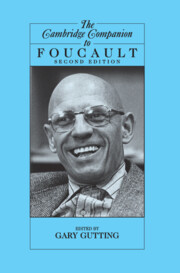Book contents
- Frontmatter
- Introduction Michel Foucault: A User’s Manual
- 1 Foucault’s Mapping of History
- 2 Foucault and the History of Madness
- 3 The Death of Man, or Exhaustion of the Cogito?
- 4 Power/Knowledge
- 5 Ethics as Ascetics: Foucault, the History of Ethics, and Ancient Thought
- 6 Michel Foucault’s Ethical Imagination
- 7 The Analytic of Finitude and the History of Subjectivity
- 8 Foucault’s Encounter with Heidegger and Nietzsche
- 9 Foucault and Habermas
- 10 Foucault’s Relation to Phenomenology
- 11 Against Interiority: Foucault’s Struggle with Psychoanalysis
- 12 Foucault’s Modernism
- 13 Queering Foucault and the Subject of Feminism
- Bibliography
- Addendum to Bibliography, 1993–2005
- Index
6 - Michel Foucault’s Ethical Imagination
Published online by Cambridge University Press: 28 August 2006
- Frontmatter
- Introduction Michel Foucault: A User’s Manual
- 1 Foucault’s Mapping of History
- 2 Foucault and the History of Madness
- 3 The Death of Man, or Exhaustion of the Cogito?
- 4 Power/Knowledge
- 5 Ethics as Ascetics: Foucault, the History of Ethics, and Ancient Thought
- 6 Michel Foucault’s Ethical Imagination
- 7 The Analytic of Finitude and the History of Subjectivity
- 8 Foucault’s Encounter with Heidegger and Nietzsche
- 9 Foucault and Habermas
- 10 Foucault’s Relation to Phenomenology
- 11 Against Interiority: Foucault’s Struggle with Psychoanalysis
- 12 Foucault’s Modernism
- 13 Queering Foucault and the Subject of Feminism
- Bibliography
- Addendum to Bibliography, 1993–2005
- Index
Summary
An ethics textbook aimed at university-level students, in listing the presuppositions of any ethical system, begins, “Singular moral judgments are never merely singular.” By their very nature moral judgments are implicitly universalizable, and only “a peculiar kind of irrationality” that “has come to infect contemporary thinking” could allow one to dispute this self-evident truth. Aristotle was mystified by those who claimed that a characteristic function could be found for an eye, a hand, a foot, a carpenter, or a tanner, but that none could be found for human beings in general. An ethical principle, according to Kant, must be universally applicable if it is to be considered as having any validity whatsoever.
Foucault, however, disconcerts. By claiming that there are no universally applicable principles, no normative standards, “no order of human life, or way we are, or human nature, that one can appeal to in order to judge or evaluate between ways of life,” Foucault, according to Charles Taylor, relinquishes any critical power that his historical analyses might have. Without such a “normative yardstick,” according to Jürgen Habermas, Foucault’s historical analyses cannot be genuinely critical. Indeed, Foucault’s skepticism with regard to the notions of universal human nature or universal rationality is clear. He associates universal human nature with the Enlightenment doctrine of humanism, which provides a vision of the human essence with which men and women are expected to conform, thus offering a universal criterion of moral judgment.
- Type
- Chapter
- Information
- The Cambridge Companion to Foucault , pp. 149 - 175Publisher: Cambridge University PressPrint publication year: 2005
- 17
- Cited by

